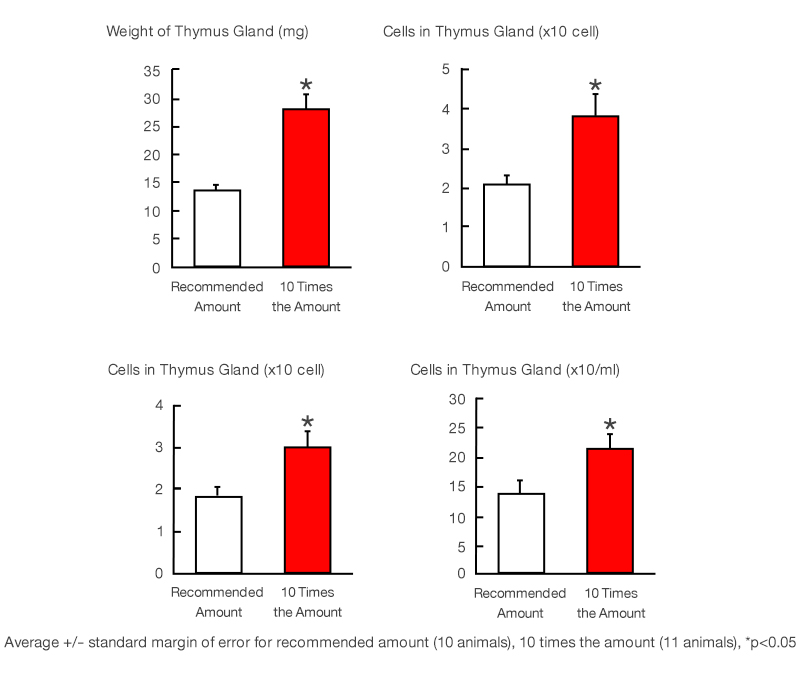Osaka Headquarters: 1-5-7 Mikuriyazakaohmaji, Hikashi, Osaka Prefecture 577-8520
The long-term consumption of vitamin C in large quantities can inhibit the reduction of cells in the immune system as well as inhibit shrinkage of the thymus gland with age
House Wellness Foods Co., Ltd. (headquartered in Itami City, Hyogo Prefecture, with Mr. Inoue Hajime as Company President) has received cooperation from Mr. Akito Ichikami (Ph.D.), Deputy Director of Research of the Institute of Ayurveda and Health Tokyo, in the testing results from experiments on animals. It was discovered that consuming vitamin C in quantities that are 10 times (1000 mg / day) the recommended dosage for humans (100 mg / day) for a prolonged period of time inhibited the decrease in the number of cells in the immune system. It also inhibited shrinkage of the thymus gland (*1) with age. The findings of this report were given at the 35th Conference on Clinical Nutrition in Japan, which was held at Kyoto Tezuka from 4-6 October 2013.
( *1) The organ responsible for the development of T-cells, which are the major cell types in the immune system. When the thymus becomes smaller with age, the capacity for creating and developing T-cells is reduced accordingly.
Vitamin C is a water-soluble vitamin. It is involved in the synthesis of collagen, L-carnitine and neurotransmitters. Human bodies cannot synthesize vitamin C by themselves. There is a recommended amount of vitamin C per day (100 mg / day), but it is known that consuming more vitamin C than the recommended dosage can cause a physiological response such as anti-oxidants helping to control blood pressure. As such, this study focuses on the effects on the immune system as well, using mice species that cannot synthesize vitamin C (SMP30KO) to determine the effects on the number of immune cells while ageing when consuming 10 times (1000 mg / day) the recommended dose of vitamin C per day for a prolonged period.
Comparing the body surfaces between humans and mice, the amount of vitamin C for humans is 100 mg / day, while for mice (SMP30KO), it is about 20 mg / kg / day. Thus, the recommended dosage for mice (20 mg / kg / day;% VC) has been increased 10 times (200 mg/kg/day;0.2%VC) and added to their diets for a period of 1 year. Organs involved in the immune system were then weighed, and the number and proportion of immune cells in the blood or internal organs associated with the immune system were collected.
When comparing mice that received vitamin C at 10 times the recommended daily dosage and the mice receiving vitamin C in the recommended daily dose for 1 year, it was showed that mice receiving 10 times the vitamin C had significantly more weight in their thymus glands and more cells in their thymus glands and spleens. The number of white blood cells (leukocytes), lymphocytes, granulocytes, and monocytes in the blood were significantly higher. In addition, the number of T-cells in the spleen and lymphocytes were significantly higher as well.
The results above show that consuming vitamin C in high doses for a long time inhibited the decrease in the number of cells in the immune system (such as T-cells) as well as inhibited the shrinkage of the thymus glad with age. That means it is possible to improve and preserve immune function in the elderly.
We plan to compile these findings in academic papers and will report more later. House Wellness Foods will continue to investigate and research the physiological functions of vitamin C and to publish its findings.






